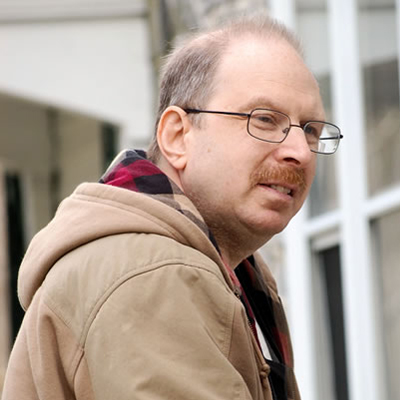Traumatic Time: Scott’s Story
In March of 2008, Scott and Jennifer Berman received shocking news. Jennifer, the mother of a 13-year-old, 17-year-old, and 20-year-old, had stage 4B non-Hodgkin’s lymphoma. And it turned out that she did not have a lot of time.
At the oncologist’s office, the Bermans found a Cancer Support Community brochure.
“Jennifer and I attended groups for the first six months after her diagnosis,” shared Scott.
“I was happy to come to the first meeting. I felt comfortable. Our group leader was
great,” he said.
Scott kept coming back. But Jennifer did not. Her declining health made it impossible. Going forward, she would be hospitalized.
“I realize that many people are reluctant to participate in anything that is perceived as ‘therapy.’ But the support groups worked because we had common ground. We could share experiences and advocate for one another,” Scott said.
Stage 4B, the most advanced stage of non-Hodgkin’s lymphoma, is characterized by swollen lymph nodes in the neck, armpits or groin, abdominal pain or swelling, chest pain, coughing or trouble breathing, and fatigue. Typical of someone with a 4B diagnosis, Jennifer had significant signs and symptoms, including fever, unintended weight loss, and severe night sweats.
From September 2008 through March 2009, Scott traveled back and forth between Bethlehem and The Temple Bone Marrow unit in Philadelphia. The couple had no family nearby, so finding someone to come and stay with their children for more than a day or two was difficult. “I would spend three days in my wife’s hospital room, on a sofa next to her bed, and then go back home for a day or two, and then go back. I lived out of a backpack. I worried about my three kids. I worried about my wife. The whole experience was traumatic,” he continued.
“I rarely missed my caregiver support group meetings. When I couldn’t attend, I would call in and give updates. Those meetings were very important to me. I knew that for two hours each week, I could get personal attention, focus on my emotional needs and say whatever I wanted or needed to say, without censoring myself. It is the only fond memory I have of that painful time.”
Jennifer’s health continued to decline, and she was admitted to hospice in March of 2009. The blood transfusions and bone marrow-stimulating drugs that were keeping her alive were no longer available to her. It was the most difficult phase of Jennifer’s cancer journey. Both Scott and Jennifer were plagued by frustration and fear.
As a psychiatrist, Scott had years of experience helping people with physical illnesses deal with their distress and their emotional needs. “I realize that many doctors are not comfortable dealing with patient or caregiver distress. Many are ill-equipped to deal with the emotional trauma a patient or caregiver experiences during an illness. But I feel that one thing every physician can do is to make sure their patients and families get proper emotional support by encouraging them to use services that can provide it. Make referrals to support groups or counselors a part of each person’s treatment plan.”
Before receiving chemotherapy, patients get a collection of prescriptions to counter the effects of these powerful drugs. One for stress. Another for nausea, and so on.
“I think that information about the Cancer Support Community should be included in that pack,” Scott said.
“Everyone affected by cancer should have some support, because they will not come through the experience without emotional scars. I am grateful that the Cancer Support Community was there for me when I needed support.”


